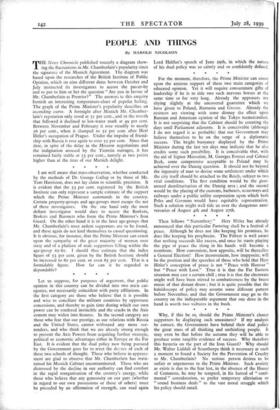Let us suppose, for purposes of argument, that public opinion
in this country can be divided into two main cat- egories, not necessarily coincident with party affiliations. In the first category are those who believe that it is possible and wise to conciliate the militant countries by opportune concessions, and thereby to gain time during which our own power can be rendered invincible and the cracks in the Axis cement may widen into fissures. In the second category are those who fear that our prestige, as our relations with Russia and the United States, cannot withstand any more sur- renders, and who think that we are already strong enough to prevent the Axis Powers from acquiring further strategic, political or economic advantages either in Europe or the Far East. It is evident that the dual policy now being pursued by the Government goes far to meet the dcs•res of each of these two schools of thought. Those who believe in appease- ment are glad to observe that Mr. Chamberlain has main- tained his Munich Cabinet uncontaminated. Those who are distressed by the decline in our authority can find comfort in the rapid reorganisation of the country's energy, while those who believe that any generosity on our part (whether in regard to our own possessions or those of others) must be preceded by an affirmation of strength, can read again Lord Halifax's speech of June 29th, in which the nature of his dual policy was so calmly and so confidently defined.








































 Previous page
Previous page